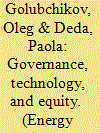|
|
|
Sort Order |
|
|
|
Items / Page
|
|
|
|
|
|
|
| Srl | Item |
| 1 |
ID:
111378


|
|
|
|
|
| Publication |
2012.
|
| Summary/Abstract |
Transforming the housing stock to a low energy performance is a key priority in the context of sustainable development and a post-carbon transition. However, in terms of its practical implementation it, firstly, faces a number of complex institutional barriers, while, secondly, involves a risk of being dominated by a narrow technocratic agenda for energy/carbon reduction that may overtake the socially progressive pursuits of housing policy. Energy efficiency strategies for the residential sector must, therefore, be multidimensional, fully synergised with housing policy, and incorporating the principles of equity, access and a balanced geographical development. This paper discusses a strategic policy framework, which was designed by the United Nations Economic Commission for Europe (UNECE) to address those important needs in international policy. The document - Action Plan for Energy-efficient Housing in the UNECE Region - outlines a number of goals, targets and actions structured at three dimensions: (i) governance and finance, (ii) technological advancement, and (iii) access and affordability. The Action Plan provides a comprehensive and integrated framework, based on which governments can shape their own pathways towards a sustainable low-energy residential sector.
|
|
|
|
|
|
|
|
|
|
|
|
|
|
|
|
| 2 |
ID:
077244


|
|
|
|
|
| Publication |
2007.
|
| Summary/Abstract |
This article provides a critique of the literature on Russian economic growth and argues that broadening the growth debate to include regional perspectives may cast new light on economic processes at work in the varied geographical context of Russia. The article shows that growth in Russia's regions is much more comprehensive than often realised in the West and is closely associated with rising levels of industrial production in the overwhelming majority of regions. This contradicts the perception that resource dependency is the only formula of success within Russia. The author also provides a close examination of Leningrad oblast', once declining but recently one of the fastest growing regions in the Russian Federation. However, although the general vector of development has changed radically, the case of Leningrad oblast' demonstrates that the growing economy perpetuates the landscape of unevenness. New technologically intensive loci of development have paralleled 'underinvested' areas - despite being situated within the same administrative and political context. Nevertheless, growth continues to trickle down to less advantageous areas, both buttressing and spurring national growth as a whole.
|
|
|
|
|
|
|
|
|
|
|
|
|
|
|
|
| 3 |
ID:
171528


|
|
|
|
|
| Summary/Abstract |
This paper problematizes the uneven nature of low carbon energy transitions in the context of uneven geographical development and core/periphery asymmetries. It explores the impacts of transition for peripheral communities lacking political power and agglomerative advantages. While decentralised developments that emerge with energy transition promise to bring new opportunities to remote areas, factors of economic and political inequalities render those opportunities socially and spatially segregated. Exploring experiences of rural and exurban communities in South Wales, the paper establishes links between low carbon transition and its actually existing implications on the ground. It demonstrates that even if having an abundance of natural resource and physical space to harness low carbon energy, many rural communities are trapped in the chronic positions of energy peripheralization.
|
|
|
|
|
|
|
|
|
|
|
|
|
|
|
|
|
|
|
|
|